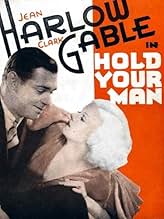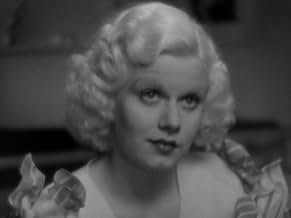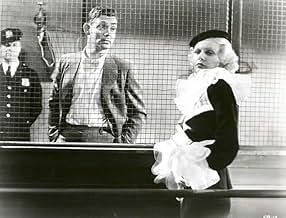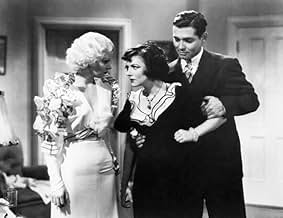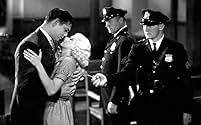AVALIAÇÃO DA IMDb
6,9/10
2 mil
SUA AVALIAÇÃO
Adicionar um enredo no seu idiomaA woman is sent to a reformatory when her con artist lover flees after killing a man during a botched blackmail scheme.A woman is sent to a reformatory when her con artist lover flees after killing a man during a botched blackmail scheme.A woman is sent to a reformatory when her con artist lover flees after killing a man during a botched blackmail scheme.
- Direção
- Roteiristas
- Artistas
- Prêmios
- 2 vitórias no total
Louise Beavers
- Elite Club Attendant
- (não creditado)
Wade Boteler
- Police Sergeant at Reformatory
- (não creditado)
Bobby Caldwell
- Ruby & Eddie's Son
- (não creditado)
Nora Cecil
- Miss Campbell
- (não creditado)
Jack Cheatham
- Policeman
- (não creditado)
G. Pat Collins
- Phil Dunn
- (não creditado)
Nell Craig
- Miss Willard - Reformatory Matron
- (não creditado)
Avaliações em destaque
"Hold Your Man" is significant as Harlow's transitional film from the pre-code days. Although technically the Hays Code did not go into effect until July 1934, studios were to some extent trying to police themselves earlier than that to take some of the heat off. Harlow is significantly de-tuned physically here, from the hot presence a year earlier in "Red-Headed Woman" and "Red Dust". It also appears that to illustrate their ability to police themselves without a formal approval process, the studio tacked on a moralistic second half that turned a very entertaining romantic comedy into a sappy melodrama.
The film begins when depression-era hustler Eddie (Clark Gable) and his pal Slim con a pedestrian out of $30. Running from the police he blunders into an apartment and finds Ruby (Harlow) taking a bath. Ruby turns out to be a bit of a con artist herself and gets rid of the police. Eddie takes off but he has made an impression on Ruby and she arranges an "accidental" meeting. They soon fall in love but their marriage plans are interrupted by Eddie's accidental murder of one of Ruby's marks. He gets away but Ruby gets two years in a reformatory, which is portrayed as an intense Home Economics class.
Until it crashes and burns at the end this is a slick little romantic comedy written by Anita Loos (Gentlemen Prefer Blondes). Gable provides his standard bravado and Harlow gives it right back to him. The script is quite clever and entertaining. Gable does not have quite the chemistry with Harlow that he had with Claudette Colbert or Rosalind Russell, but this is the kind of film that is best when its two stars are competing instead of cuddling.
Unfortunately the audience's identification impulse and emotional connection are casualties of Harlow's abrupt personality change from gritty seductress to dewy-eyed self-pitying victim. This confuses and distances those who were most involved in the story until that point.
Then again, what do I know? I'm only a child.
The film begins when depression-era hustler Eddie (Clark Gable) and his pal Slim con a pedestrian out of $30. Running from the police he blunders into an apartment and finds Ruby (Harlow) taking a bath. Ruby turns out to be a bit of a con artist herself and gets rid of the police. Eddie takes off but he has made an impression on Ruby and she arranges an "accidental" meeting. They soon fall in love but their marriage plans are interrupted by Eddie's accidental murder of one of Ruby's marks. He gets away but Ruby gets two years in a reformatory, which is portrayed as an intense Home Economics class.
Until it crashes and burns at the end this is a slick little romantic comedy written by Anita Loos (Gentlemen Prefer Blondes). Gable provides his standard bravado and Harlow gives it right back to him. The script is quite clever and entertaining. Gable does not have quite the chemistry with Harlow that he had with Claudette Colbert or Rosalind Russell, but this is the kind of film that is best when its two stars are competing instead of cuddling.
Unfortunately the audience's identification impulse and emotional connection are casualties of Harlow's abrupt personality change from gritty seductress to dewy-eyed self-pitying victim. This confuses and distances those who were most involved in the story until that point.
Then again, what do I know? I'm only a child.
Hold Your Man finds Jean Harlow, working class girl from Brooklyn falling for con man Clark Gable and getting in all kinds of trouble. The film starts out as his film, but by the time it's over the emphasis definitely switches to her character.
The film opens with Gable pulling a street con game with partner, Garry Owen and the mark yelling for the cops. As he's being chased Gable ducks into Harlow's apartment and being he's such a charming fellow, she shields him.
Before long she's involved with him and unfortunately with his rackets. Gable, Harlow, and Owen try pulling a badger game on a drunken Paul Hurst, but then Gable won't go through with it. Of course when Hurst realizes it was a con, he's still sore and gets belligerent and Gable has to punch him out. But then he winds up dead outside Harlow's apartment and that platinum blond hair makes her easy to identify. She goes up on an accomplice to manslaughter.
The rest of the film is her's and her adjustment to prison life. Her interaction with the other female prisoners give her some very good scenes. I think some of the material was later used for the MGM classic Caged.
Harlow also gets to do the title song and it's done as torch style ballad, very popular back in those days. She talk/sings it in the manner of Sophie Tucker and quite well.
Gable is well cast as the con man who develops a conscience, a part he'd play often, most notably in my favorite Gable film, Honky Tonk.
Still it's Harlow who gets to shine in this film. I think it's one of the best she did at MGM, her fans should not miss it.
The film opens with Gable pulling a street con game with partner, Garry Owen and the mark yelling for the cops. As he's being chased Gable ducks into Harlow's apartment and being he's such a charming fellow, she shields him.
Before long she's involved with him and unfortunately with his rackets. Gable, Harlow, and Owen try pulling a badger game on a drunken Paul Hurst, but then Gable won't go through with it. Of course when Hurst realizes it was a con, he's still sore and gets belligerent and Gable has to punch him out. But then he winds up dead outside Harlow's apartment and that platinum blond hair makes her easy to identify. She goes up on an accomplice to manslaughter.
The rest of the film is her's and her adjustment to prison life. Her interaction with the other female prisoners give her some very good scenes. I think some of the material was later used for the MGM classic Caged.
Harlow also gets to do the title song and it's done as torch style ballad, very popular back in those days. She talk/sings it in the manner of Sophie Tucker and quite well.
Gable is well cast as the con man who develops a conscience, a part he'd play often, most notably in my favorite Gable film, Honky Tonk.
Still it's Harlow who gets to shine in this film. I think it's one of the best she did at MGM, her fans should not miss it.
Clark Gable plays a con man who busts into the life of hard-boiled dame Jean Harlow. He tries to sucker her while she brushes him off with her tough-gal attitude. Despite their cynicism and cons they fall in love. When Gable accidentally kills a man during a sting he runs out leaving loyal Harlow to women's prison where she discovers she's pregnant. Anita Loos' and Howard Emmett Rogers' writing is excellent throughout with many well-drawn and surprising characters (including a Jewish socialist woman inmate and a black woman inmate and her preacher father played with hardly a trace of stereotype). Gable and Harlow show their mettle as actors adding telling nuances and quirks to their characters that send them beyond the typical Gable and Harlow roles. And the direction is much better than you'd expect from Sam Wood. One beautiful shot has Harlow being inducted into the prison, then led out into a surprisingly snowy courtyard as the camera tracks after her. This is one of the best of both the "criminals in love" and "women's prison" genres and has some of the best hard-boiled dialogue ever written.
This pre-Code box office success pairs Clark Gable with Jean Harlow. Gable plays Eddie, a purveyor of the short con who, after taking advantage of his mark (or his women) quickly moves on. Harlow is Ruby, a platinum blond with common tastes who gets around and knows how to handle herself. She's the wiser of the two and she knows the odds are stacked against Eddie due to his criminal myopia.
After Eddie does a stint in jail, their relationship changes, but the consequences of past crimes derail the couple. Some reviewers have said that the film changes tone at this point and suffers from the change in focus. But this is when the viewer realizes this is Ruby's story. Eddie is the one who goes through the greatest transformation, but the tale is told from Ruby's point of view and we follow her ordeals.
Fortunately, Ms. Harlow is up to the challenge, delivering a touching performance that is multi-dimensional and deeply touching.
After Eddie does a stint in jail, their relationship changes, but the consequences of past crimes derail the couple. Some reviewers have said that the film changes tone at this point and suffers from the change in focus. But this is when the viewer realizes this is Ruby's story. Eddie is the one who goes through the greatest transformation, but the tale is told from Ruby's point of view and we follow her ordeals.
Fortunately, Ms. Harlow is up to the challenge, delivering a touching performance that is multi-dimensional and deeply touching.
Love conquers all. That includes reality as defined in this pre-Code tearjerker. I would sympathize with the moral if the end weren't exaggerated into such a pile of mush. As others point out, the first half is sprightly as Gable and Harlow work the shady side of life. But then Gable accidentally kills a guy, while Harlow gets nabbed for a con job. So it's off to the hoosegow for both. Actually Gable drops out, while we follow Harlow's jaunt in a military- type slammer for women. Babes behind bars it ain't. The girls get to wear shapeless smocks, presided over by a bunch of long black crows (Patterson, et al.). One thing this segment proves—women can march from here to there in lockstep as well as men.
Some pre-Code highlights—Harlow in a gown unruffled by underwear; an actual socialist loudly denouncing the "system"; an unmarried Harlow with-child after an undisguised night with Gable; a peek-a-boo with Harlow in the bathtub. And though it's not pre-Code, the black minister and his inmate daughter rise above stereotype of the day. In fact, Theresa Harris is so winning as daughter Lillie Mae, she nearly steals the show. I can see why she had such a long career, even if mainly as menials.
The movie's a good look at MGM's golden twosome in their prime. And if the material falters, the stars manage to shine. So fans should be happy, despite the soggy ending.
Some pre-Code highlights—Harlow in a gown unruffled by underwear; an actual socialist loudly denouncing the "system"; an unmarried Harlow with-child after an undisguised night with Gable; a peek-a-boo with Harlow in the bathtub. And though it's not pre-Code, the black minister and his inmate daughter rise above stereotype of the day. In fact, Theresa Harris is so winning as daughter Lillie Mae, she nearly steals the show. I can see why she had such a long career, even if mainly as menials.
The movie's a good look at MGM's golden twosome in their prime. And if the material falters, the stars manage to shine. So fans should be happy, despite the soggy ending.
Você sabia?
- CuriosidadesWhen Eddie is looking around Ruby's apartment, waiting for his clothes to dry, he spots a pennant on the wall that says "Albany Night Boat." That refers to the steamships that would depart New York City in the early evening for an overnight trip up the Hudson River to Albany. The ships had hundreds of staterooms and often were used---as the film's contemporary audience would know---for romantic getaways or illicit affairs. The pillow Eddie sees next also may have been a souvenir from the ship, as it's inscribed, "We're here to-day/To-morrow we're through/So let's be gay/It is up to you." Such trips peaked in the early 20th century, but started to decline in the 1930s when less costly, speedier, and more efficient modes of transportation by rail and automobile came to the fore. By the 1940s, the Albany Night Boat had virtually ceased to exist.
- Erros de gravaçãoWhen Eddie slams the door after tossing Aubrey Mitchell out of the apartment, the wall shakes.
- ConexõesFeatured in Mademoiselle Dinamite (1933)
- Trilhas sonorasHold Your Man
(1933) (uncredited)
Music by Nacio Herb Brown
Lyrics by Arthur Freed
Played on a record and sung by Harriet Lee
Reprised by Jean Harlow, playing piano and singing
Principais escolhas
Faça login para avaliar e ver a lista de recomendações personalizadas
- How long is Hold Your Man?Fornecido pela Alexa
Detalhes
- Data de lançamento
- País de origem
- Idioma
- Também conhecido como
- Amar e Ser Amada
- Locações de filme
- Empresa de produção
- Consulte mais créditos da empresa na IMDbPro
Bilheteria
- Orçamento
- US$ 266.000 (estimativa)
- Tempo de duração
- 1 h 27 min(87 min)
- Cor
- Proporção
- 1.37 : 1
Contribua para esta página
Sugerir uma alteração ou adicionar conteúdo ausente


